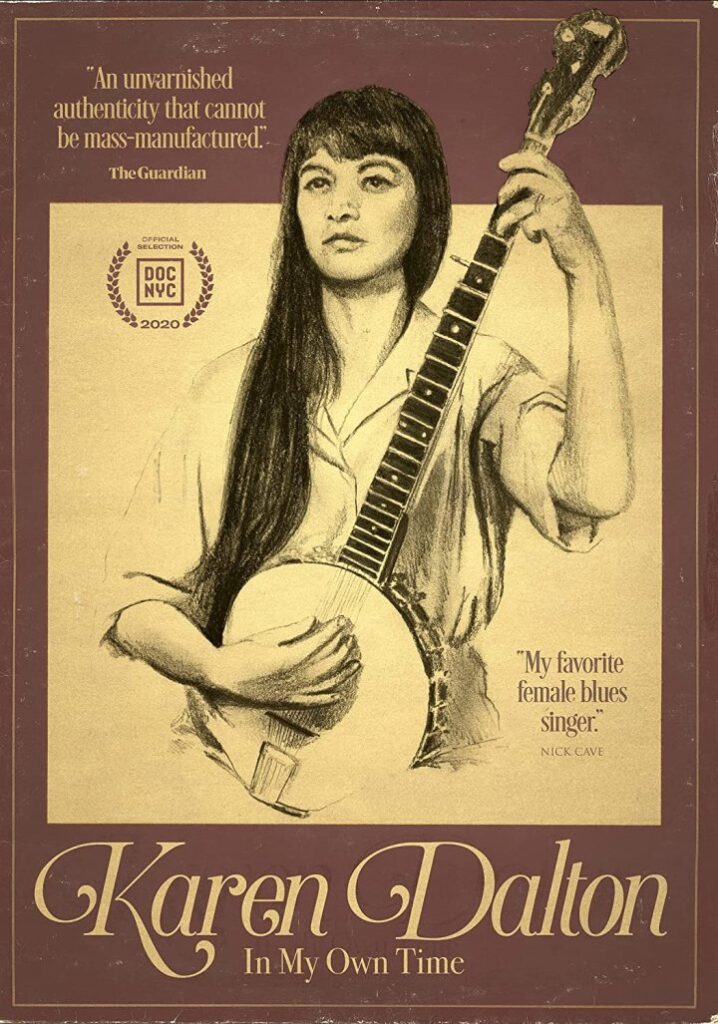
Karen Dalton, as described by one of the participants in this documentary, was one of the few folk singers in the Greenwich Village scene who was actually “folk”. Born in Texas, raised in Oklahoma, she was married twice before she was 18 and had two kids as well. But life as a homemaker wasn’t for her, when her heart was in music. She left Enid, Oklahoma, and her husband and child, to go to Greenwich Village to play guitar and sing songs. While her commercial impact was negligible, with two albums that didn’t sell recorded several years after the folk scene’s heyday, her impact on those around her was profound.
Karen Dalton: In My Own Time is a documentary consisting of interviews with her admirers, those who performed with her, and occasional family members (including her daughter, her husband, and at least one lover) about the tumultuous life she led, and the music that came from it. Karen Dalton was a folk performer, singing standards and obscure folk songs in her own idiom. Playing mostly 12-string guitar or long-neck banjo, her singing was in a bluesy style that could be compared in tone and phrasing to Billie Holiday.
Her story is told in a roughly chronological order, and is a familiar story. Great musical talent, with a difficult temperament and a sense of artistic integrity almost deliberately calibrated to make success in the music industry impossible. She impressed the folk enthusiasts in Greenwich, including Bob Dylan, who wrote about her in his memoirs. But she wasn’t equipped, emotionally, to be admired. She didn’t mind attention, but didn’t want everything attention brought with it.
And she was clearly unstable. At some point, she decided her daughter should be with her… so she kidnapped her from Oklahoma. This is one of the sections of this largely uncompromising biography that is coated with a thick layer of sugar. While her daughter narrates what is unquestionably a kidnapping, what we see is in animated sequence of a woman rescuing a little girl. Because, apparently, life in Enid, Oklahoma is so terrible that is doesn’t matter how one gets out of it.
This is not the only example in the film where a demonstrable character flaw is whitewashed by the filmmaking. Karen Dalton was, no doubt, an emotionally disturbed individual. The most common refrain from the interviewees is, “We had an argument, and that was the last time I ever saw her.” And one point, after living in Colorado, she heads back to New York, after a brief detour to Enid to drop her daughter off as if she’d never taken her away.
She recorded two albums, neither of which was a great commercial success. She managed a contract for more, but drug abuse and a disconnect from the mechanics of popular music short circuited any possible positive results. By the late ’70s, her commercial career as a musician was essentially over. By the late ’80s, she was living alone with AIDS, likely from her heroin addiction.
Her life was a sad story, and one filled with self-inflicted difficulty. But though the film has perhaps too apologetic a tone (there’s a sense in many of the interviews that Dalton’s personality flaws might be the fault of the people she dealt with), it’s the simple truth that great art often comes from troubled individuals. And one major flaw I find in this film, which is, I think, aimed at people who might not familiar with Karen Dalton, is that her music is presented in brief excerpts.
Watching the film, I didn’t see what the big deal was. Listening to the albums (as I am, right now, writing this review), I can feel the power of her work. As much as I admire Nick Cave, who is a prominent interviewee in the film, hearing him praise “Something on Your Mind” doesn’t have the same impact as listening to the song.
Karen Dalton: In My Own Time is mostly effective. It is not a hagiography, which is appropriate because the aspects of Dalton’s private life we learn are not praiseworthy. We never hear from the husbands or the child she abandoned. But great art can come from difficult lives, and judging the worth of the art from the person that makes it is madness. I have misgivings about some of the tonal aspects of the film (particularly that kidnapping that is made to look cute with some animated sequences.) But it properly evokes the desperate nature of a pure artist; pure in that she would sacrifice everything: money, friends, even her family, for her art.
Karen Dalton: In My Own Time will be released November 16 on DVD by Kino Lorber. Extras on the disc include trailers for the film, and other Kino Lorber releases.